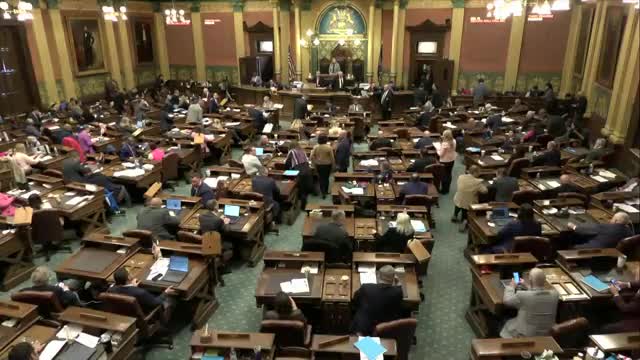House approves "Brown Alert" bill to notify public of dangerous water contamination
Get AI-powered insights, summaries, and transcripts
Subscribe
Summary
House Bill 4427, described on the floor as the "Brown Alert," was presented as a measure to notify the public—via emergency alerts—when water contamination (including dangerous E. coli levels) makes recreational water unsafe. Representative Saint Germain urged passage calling it a "common sense" public‑health step; the bill was reported passed and
The Michigan House approved House Bill 4427, which would create a "Brown Alert" under the Emergency Management Act to notify the public when recreational waters reach dangerous contamination levels (described in the floor remarks as unsafe levels of E. coli).
Representative Saint Germain told the House the bill would trigger emergency alerts from the state's emergency management system to cell phones when testing detects dangerous levels of bacteria or other contamination that make it unsafe to swim, fish or otherwise contact the water. "House Bill 4,427 is a proactive, common sense measure to safeguard public health," Saint Germain said on the floor, noting that current monitoring information does not always reach people who recreate on lakes and rivers.
The clerk announced the final passage of HB 4427 and recorded the tally in the transcript as "94 aye votes and 10 aye votes" (the second word is rendered as "aye" in the transcript excerpt); the House ordered immediate effect. The transcript phrasing of the tally contains an internal inconsistency; the article records the clerk's announced numbers as reported on the floor and notes the transcript ambiguity.
Implementation: The bill amends the Emergency Management Act to establish thresholds for issuing a Brown Alert when water-quality monitoring indicates health‑hazard levels. The floor remarks referenced Michigan's existing public water‑quality reporting systems and argued the new alert would close a communication gap. Detailed operational procedures, agency responsibilities, and notification thresholds were not specified in the floor remarks.
Looking ahead: With immediate effect ordered on the day of passage, implementing agencies (for example, the Department of Environment, Great Lakes, and Energy and the state's emergency management office) would be expected to coordinate alerting procedures; the transcript does not record those administrative steps.
